A Simple (But Impactful) Guide on the True Benefits & Importance of Change Management
Overview: Advantages of Change Management Process
 Change management is like the unsung hero of project success. Sometimes, project leaders might not immediately see the benefits change management bring because they’re so engrossed in the nitty-gritty of tasks and timelines. But actually, change management is the glue that holds everything together and helps projects succeed.
Change management is like the unsung hero of project success. Sometimes, project leaders might not immediately see the benefits change management bring because they’re so engrossed in the nitty-gritty of tasks and timelines. But actually, change management is the glue that holds everything together and helps projects succeed.
Project initiatives aren’t simply about technical deployment and timelines; they’re about people. Most projects can’t reach their intended ROI and benefits if the people and groups that need to change the way they do things aren’t onboard and don’t make the change.
Change management ensures that everyone on the team is on board, from the top brass to the newest team member. It’s the compass that guides the ship through the stormy waters of transition, making sure everyone reaches the destination successfully.
Below is what you need to know to educate stakeholders and company leaders, and to make a case about the importance of change management.
Importance of Organizational Change Management
Organizational change management (OCM) involves applying structured change methodologies to manage the people side of change. Changes can include new business processes, new systems and technology integration, mergers and acquisition integration, new products, expanding to new markets, new skills, new company vision and many more.
A program or project management team is responsible for designing, developing and deploying the new solutions. But it is the impacted employees and end-users who need to successfully adopt the new solutions before these solutions can provide value to the organization. A key benefit of effective organizational change management strategies is that it increases end users’ willingness and ability to accept and use new solutions.
When users embrace and adopt new solutions that are being implemented by a project, it increases that organization’s return on investment for that project as outlined below.
Change Management Benefits – ROI Achievement
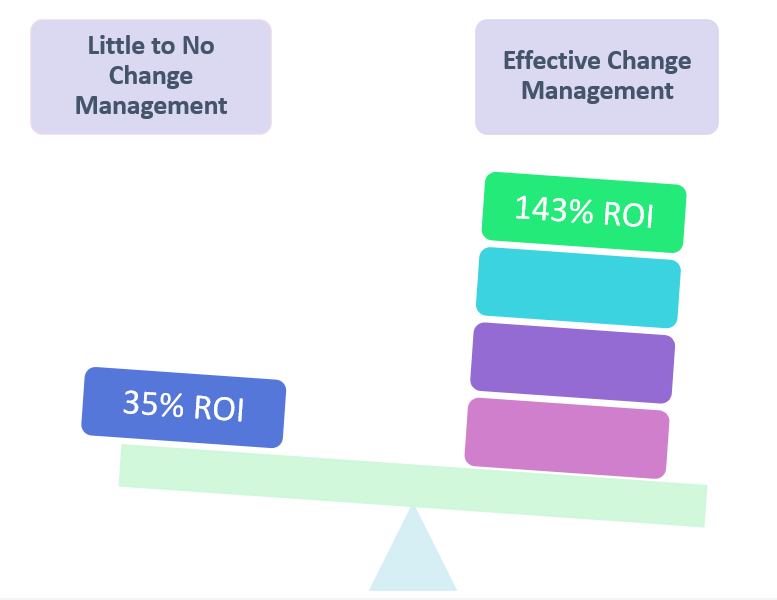
According to a study cited by McKinsey, Companies using effective change management achieve 143% of the expected project ROI as compared to just 35% for those using little to no change management.
What Are the Benefits of Change Management for the Organization?
Now, go through some of the change management benefits to organizations. Before you can explain change management advantages to others in your organization, you should thoroughly understand them yourself.
Embracing change management brings a plethora of value-adds to organizations, acting as a catalyst for smoother transitions and heightened overall performance. Here are several key advantages of change management process inclusion.
1. Increased Employee Engagement
One of the benefits of change management is increased employee engagement. Change management fosters open communication and involvement, making employees feel heard and valued. Engaged employees are more likely to adapt positively to changes and contribute creatively to the organization’s goals.
2. Enhanced Productivity
A well-managed change process minimizes disruptions, ensuring that employees remain focused on their tasks. This results in sustained productivity levels during periods of change, preventing unnecessary dips in organizational efficiency. Improved productivity is a key benefit of effective organizational change management strategies that helps projects achieve ROI expectations.
3. Improved Morale and Job Satisfaction
Another of the change management benefits is improved moral and job satisfaction. Addressing concerns, providing support, and involving employees in the change process contribute to higher morale and job satisfaction. When employees feel their well-being is considered, they are more likely to embrace change with a positive attitude.
4. Reduced Resistance and Conflict
When a project faces employee resistance and backlash, or when a general lack of stakeholder awareness and buy-in exists, the initiative likely will not achieve all of its stated objectives. Change management anticipates and addresses potential sources of resistance, minimizing conflict within the organization. Proactively managing concerns helps build a more cooperative and harmonious workplace environment.
Buy Now!
Making the Case for Change Management PPT. It Helps You Explain the Benefits of Change Management.

5. Higher Success Rate of Change Initiatives
One of the bottom-line benefits change management provides is higher project success rates. Organizations with robust change management practices are more likely to achieve successful outcomes in their initiatives. By strategically planning and implementing changes, the organization increases the likelihood of meeting its objectives on time and within budget.
6. Flexibility and Adaptability
Change management equips employees with the skills and mindset needed to adapt to new situations. This enhanced adaptability is a valuable asset in today’s dynamic business environment, where the ability to pivot is often a key to success.
7. Risk Mitigation
Risk mitigation is another one of the change management benefits to organizations. Change initiatives inherently carry risks. Change management systematically identifies and mitigates these risks, reducing the likelihood of project derailment and financial losses.
8. Consistent Communication
One of the benefits of change management is ongoing communications. Clear and consistent communication is a hallmark of effective change management. This transparency builds trust among employees and stakeholders, creating a positive atmosphere conducive to successful change implementation.
9. Enhanced Customer Satisfaction
Change management benefits customers as well. Changes within an organization can have a ripple effect on external stakeholders, including customers. Change management ensures that customer-facing aspects are considered, leading to improved customer satisfaction and loyalty.
10. Long-Term Organizational Agility
One of the key change management advantages is organizational agility. Organizations that prioritize change management develop a culture of continuous improvement and agility. This adaptability positions them to navigate future changes more effectively, staying ahead in competitive markets.
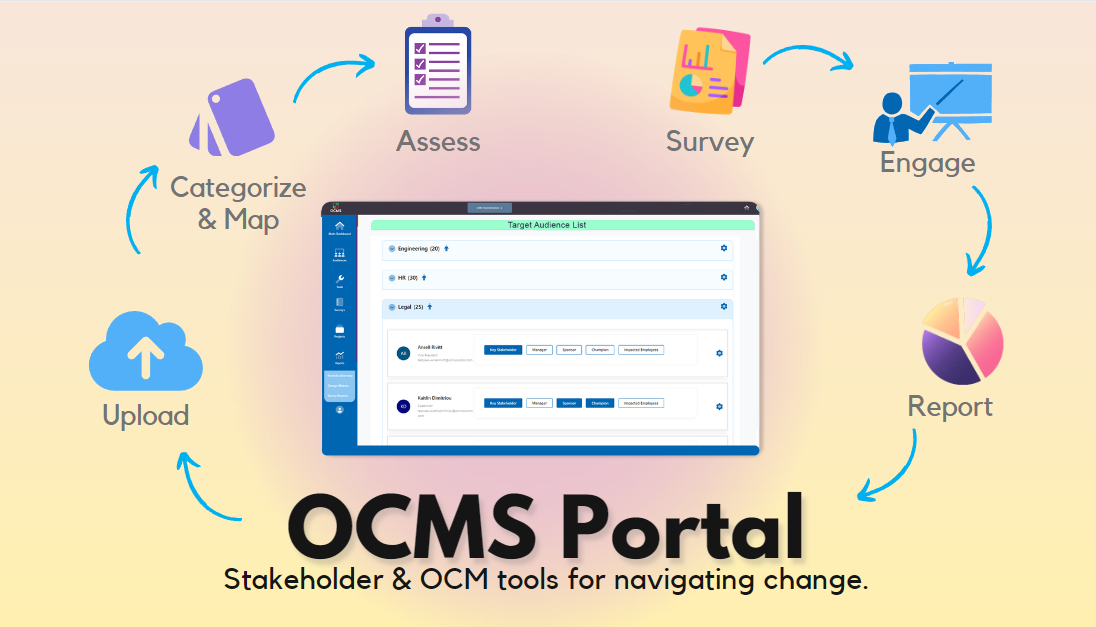
In summary, change management is not just a box to check; it’s a strategic investment that pays dividends in employee satisfaction, organizational efficiency, and long-term success. There are many benefits of change management for the organization and its initiatives.
The charts and sections below present some additional statistics illustrating the benefits of organizational change management.
These are the key factors why organizations are choosing today to leverage a structured change management process to help increase the success of their initiatives and programs. These findings of the benefits of organizational change management are based on decades of studies by Prosci and other research organizations.
Are you still wondering how to answer, “What are the benefits of change management?” for your leadership? Then this video and PowerPoint template may help. Check out our presentation “Making the Case for Change Management.”
Benefits Change Management: Projects Achieve Their Objectives
Studies show that an organizational change initiative, program or project is 6x more likely to achieve its objectives when there is an excellent change management structure. When there is no or poor change management, only 16% of projects reach their objectives, as compared to 96% with excellent OCM support.
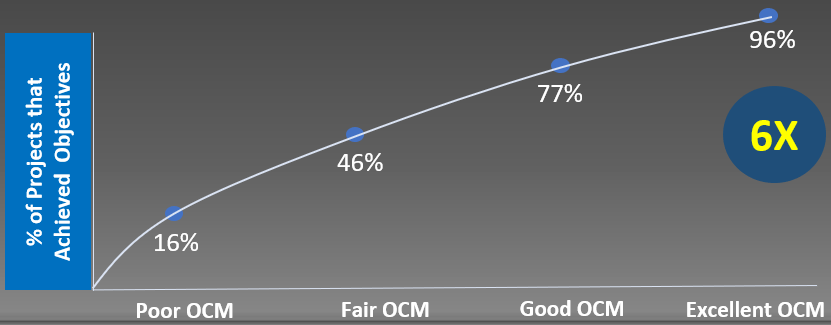
Benefits of Change Management: Projects Meet or Beat Deadlines
The second benefit of organizational change management is that a project, program or organization initiative has a 72% probability of staying on or ahead of schedule with a well-defined change program.
If we don’t bring impacted users along via an efficient OCM process, there is an increase in delays and reworks, as well as retraining from active or passive resistance to the change. With a structured change management process, we can effectively get impacted users to buy-in into the change, and to successfully adopt the change.
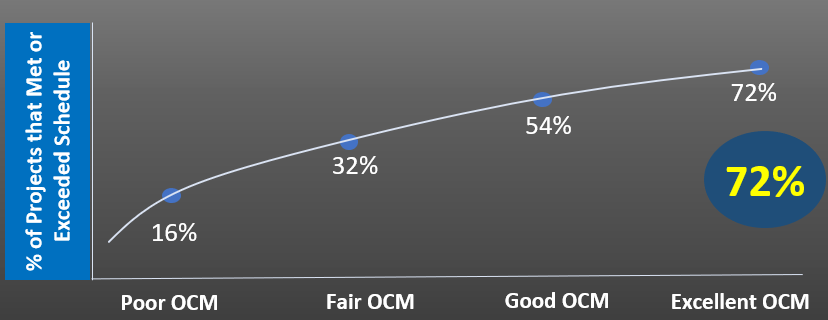
OCM Benefit: Projects Are Completed Below Budget
Another of the advantages of change management process support is that a project, program or initiative has an 81% probability of being completed on budget. With poor OCM, less than half (48%) of projects stayed within the budget.
When project budgets run over, that impacted the expected return on investment. So, as you can see, change management benefits to organizations direct impact their bottom-line objectives.
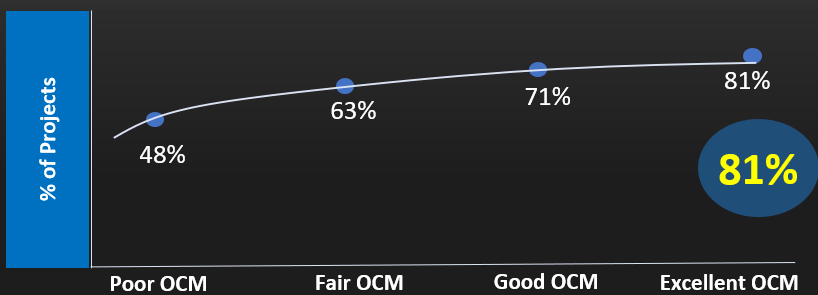
Conclusion | Explaining Change Management Benefits
The significance of change management in organizational dynamics cannot be overstated. As organizations navigate the complex landscapes of modern business, the benefits derived from effective change management practices become increasingly evident.
From fostering employee engagement and morale to mitigating risks and ensuring the success of change initiatives, the positive impact is comprehensive.
Embracing change management is not merely a best practice; it is a strategic imperative for organizations aiming not only to survive but to thrive in an ever-evolving environment.
By prioritizing the people side of change, organizations position themselves not just for successful transitions, but for the cultivation of a resilient and adaptable culture that is primed for sustained success in the long run.
Do you have questions or feedback about the value and change management benefits to organizations? Please reach out and let us know.
Benefits of Change Management FAQ
What is change management?
Project initiatives aren't simply about technical deployment and timelines; they're about people. Most projects can't reach their intended ROI and benefits if the people and groups that need to change the way they do things aren't onboard and don't make the change. Organizational change management (OCM) involves applying structured change methodologies to manage the people side of change.
What are the benefits of change management for the organization?
Embracing change management brings multiple benefits. Here are several key advantages of change management process inclusion:
- Increased employee engagement
- Enhanced productivity
- Improved morale & job satisfaction
- Reduced resistance & conflict
- Higher success rate of change initiatives
- Flexibility & adaptability
- Risk mitigation
- Consistent communication
- Enhanced customer satisfaction
- Long-term organizational agility
What are some monetary change management benefits?
Bottom-line benefits of change management include, projects having a higher chance at reaching and exceeding the expected ROI, and coming in on budget and on time.
Note: Content on OCM Solution's ocmsolution.com website is protected by copyright. Should you have any questions or comments regarding this OCM Solutions page, please reach out to Ogbe Airiodion (Change Management Lead) or the OCM Solutions Team today. OCM Solution was previously known as Airiodion Global Services (AGS).
External source: stock.adobe.com







